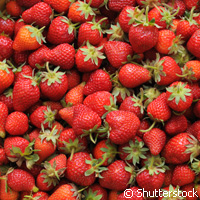Strawberries good news for combating alcohol's effect on stomachs, scientists say
A pan-European team of researchers has shown that eating strawberries can have a protecting effect on stomachs damaged by alcohol as they can help protect stomach mucous membranes. The team, made up of researchers from Italy, Serbia and Spain, set out in the journal PLoS One how the antioxidant properties found in strawberries could help improve treatments for stomach ulcers. With a EUR 2,999,999 boost of funding from the EUBerry ('The sustainable improvement of European berry production, quality and nutritional value in a changing environment: Strawberries, Currants, Blackberries, Blueberries and Raspberries') project, part of the 'Food, agriculture and fisheries, and biotechnology' Theme of the EU's Seventh Framework Programme (FP7), the team was able to prove that consumption of strawberry extract was directly linked with suffering less damage to the stomach mucous membrane. The study proves that a diet rich in strawberries can help prevent gastric diseases linked to the generation of free radicals or other reactive oxygen species (ROS). One of the study authors, Sara Tulipani from the University of Barcelona, comments: 'The positive effects of strawberries are not only linked to their antioxidant capacity and high content of phenolic compounds (anthocyans) but also to the fact that they activate the antioxidant defences and enzymes of the body.' These results also have implications for those who suffer from stomach problems unrelated to alcohol consumption. Gastritis or inflammation of the stomach mucous membrane can also be caused by viral infections or by non-steroidal anti-inflammatory medication such as aspirin, as well as medication used to treat against the infamous stomach bacteria Helicobacter pylori. Another study author, Maurizio Battino from Marche Polytechnic University in Italy, suggests that in these cases consuming strawberries after diagnosis can 'lessen stomach mucous membrane damage.' Battino also stresses that their study aim was not to find a way of lessening the effects of excessive drinking but to discover 'molecules in the stomach membrane that protect against the damaging effects of differing agents.' The main aim of the EUBerry project, which brings together researchers from Finland, France, Germany, Italy, the Netherlands, Norway, Poland, Portugal, Spain and the United Kingdom and runs until 2014, is to provide the necessary knowledge and tools to facilitate development of consumer-desirable fresh berry fruits of high nutritional quality optimal for human health at a competitive cost. In addition, it is hoped that the pan-European team will succeed in the development and validation of a set of tools to improve competitiveness of European berry production and consumer accessibility to berry fruits. The EUBerry platform will be developed and validated by using strawberries, raspberries and blueberries as model crop species. Additionally, specific critical points related to the improvement of berry fruit quality and the reduction of production costs will be considered for currants and blackberries.For more information, please visit:PLoS One:http://www.plosone.org/home.action
Countries
Spain, Italy, Serbia



